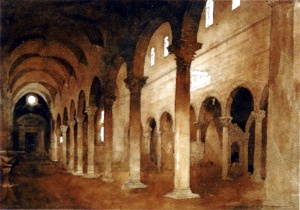Difference between revisions of "Incarnandist Basilica"
Jump to navigation
Jump to search

Trismegistus (talk | contribs) m (correct historical statement) |
Trismegistus (talk | contribs) m |
||
| (One intermediate revision by the same user not shown) | |||
| Line 1: | Line 1: | ||
[[File:JohnRuskin+InteriorofSanFredianoLucca+1845+PublicDomain.jpg|thumb|300px|Interior of a Basilica used for worship after the [[Isbajutha]] by Incarnandists]] | [[File:JohnRuskin+InteriorofSanFredianoLucca+1845+PublicDomain.jpg|thumb|300px|Interior of a Basilica used for worship after the [[Isbajutha]] by Incarnandists]] | ||
| − | Ancient Yophenthean and Midretassene courthouses where the magistrate would receive petitioners and hear law cases were called basilicas. During the [[Middle Ages of Chaos]], these centers of law fell into disuse and disrepair. The [[Tisbaja|Tisbajuma]] occupied them and made them gathering places for like-minded individuals to convene. They became centers of governance and in many cases worship of the [[Incarnandism|Incarnandist Religion]]. | + | Ancient Yophenthean and Midretassene courthouses where the magistrate would receive petitioners and hear law cases were called basilicas. During the [[Middle Ages of Chaos]], these centers of law fell into disuse and disrepair. The [[Tisbaja|Tisbajuma]] occupied them and made them gathering places for like-minded individuals to convene. They became centers of governance and, in many cases, the worship of the [[Incarnandism|Incarnandist Religion]]. |
| Line 11: | Line 11: | ||
[[Category:Basilicas]] | [[Category:Basilicas]] | ||
| + | [[Category:Incarnandism]] | ||
{{stub}} | {{stub}} | ||
Latest revision as of 22:16, 22 October 2018

Interior of a Basilica used for worship after the Isbajutha by Incarnandists
Ancient Yophenthean and Midretassene courthouses where the magistrate would receive petitioners and hear law cases were called basilicas. During the Middle Ages of Chaos, these centers of law fell into disuse and disrepair. The Tisbajuma occupied them and made them gathering places for like-minded individuals to convene. They became centers of governance and, in many cases, the worship of the Incarnandist Religion.
See Also
| This article is a stub. It requires further development by the creator. |